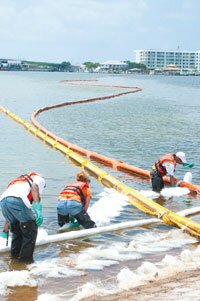ESSAY- Cap this: What's lost in the BP clean-up

Finally but tentatively Uncle Sam and BP are declaring the largest oil spill in off-shore history capped. BP's latest approach has halted the flow of a guesstimated 184 million gallons of crude into the Gulf of Mexico, and if everything– including Mother Earth,– holds, the story will drop out of public consciousness quickly.
Sadly, in my four-inch thick file of Washington Post, New York Times, and Charlottesville Daily Progress articles, only once does a news story connect the disaster with America's annual driving of 2.9 trillion miles.
Eighteen days after the Deepwater Horizon sank, a geologist told the Associated Press, "They'll refine [any captured oil] and crack it... and by the time it gets in your gas tank, you'll never even know it was in the water."
In none of my stories is it said that oil companies would never have drilled in deepwater except that Americans consume 20 million barrels of petroleum daily, two-thirds in auto fuel tanks.
Looking at my stack of headlines, today I know how to sue oil companies, how the crisis affected President Obama and what the giant plumes of undersea oil could mean in the long-run.
I've learned the Gulf spill probably pales next to other manmade environmental disasters, like the Dust Bowl or the slaughtering of buffalo. I know that BP's chief executive likes yacht racing.
I know the "spill cam" was mesmerizing.
I've learned that BP is hated on Facebook and Twitter and that Jimmy Buffett has weighed in with changes in latitude in his paradise. I've been taught that Mother Nature doesn't respond to press releases.
I have thousands and thousands of words about estimating the flow. I've learned how to shuck an oyster.
I know about sand booms, undersea robots, alliances between environmental groups and oil companies, burn-offs, dispersants, fishing and fear but what mainstream media has never told me, nor anyone else, is anything which might cause
Americans to reassess our default position of key-in-the-ignition to get anywhere, everywhere, and sometimes nowhere. Similarly, though, a huge Pew Charitable Trust survey in 2002 found that three quarters of the world thought the U.S. excursion into Iraq would be "blood for oil," mainstream American media in that case failed to connect our driving with the fact that Iraq had the largest undeveloped oil fields in the world.
In all of this coverage, or, indeed, during extensive mainstream coverage of global warming bills, we haven't been reminded that America has 251 million cars and trucks, or that they produce almost half of the world's automotive CO2 emissions.
It hasn't been pointed out that 69 percent of every barrel of oil becomes auto fuel. Nor that American transportation uses 200 billion gallons of gasoline and diesel annually while producing 1,959 million metric tons of greenhouse emissions.
Nothing is said, still, about transportation being the largest and fastest growing generator of greenhouse emissions– and of oil consumption– in our economy. We haven't learned that with 4.5 percent of the world's population and 2.7 percent of its oil reserves, Americans use 26 percent of world oil production in some 411 billion annual car starts.
For three months of daily coverage no news story has asked this basic question: "Why would BP pay $500,000 a day, to rent the Deepwater Horizon while knowing that the Exxon Valdez cost Exxon stockholders over $3 billion?"
The answer is not primarily because the British oil firm has a gambling corporate culture– if it does, as another series of stories wondered. It's because "black gold" created by individual demand for driving offsets the assurance of eventual calamity.
A logical reason for today's media market failure is losing yet more advertisers. But 15 years ago when mainstream media were booming economically, both Ford Motor Company and Shell Oil were backers of the economic "best-first" solution, a serious gasoline tax. Think long-term with a rational gasoline taxing policy, politicians Jerry Brown, Paul Tsongas, and H. Ross Perot told America a few years earlier, and we'll break our dependence on oil from the Middle East without needing to drill a mile below the ocean's surface or in the Arctic National Wildlife Refuge.
Even in the age of bloggers– who, after all, depend on actual reporting to have anything to blog about– if print reporting doesn't cover any aspect of any news item, it won't break into mainstream minds and only a handful of Americans will recognize, as the old Pogo cartoon put it years ago, "We have met the enemy and he is us."
American politicians always wait to "find out which way the parade is going to get in front" (as the apt description of political leadership has it). Until our media begin providing the information for that parade, the bottom line is that our sons and daughters will continue to fight in the Middle East, and our fish and fowl will continue to face black gold in the deepwater.
Now that the spill is over, will they finally explain why it started?
~
A former journalism teacher at Virginia Union University, Randy Salzman is a transportation researcher who penned an essay entitled "Footprints, indeed: Why we can't innovate away our carbon" long before the spill became news.
#